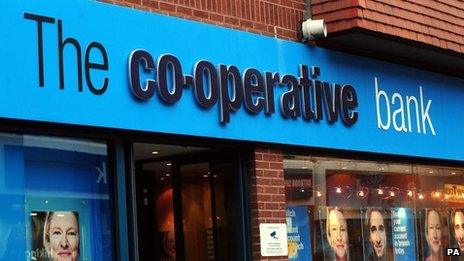Co-op Group to lose control of Co-op Bank
- Published

Co-op Group's hopes of retaining control of Co-op Bank after its £1.5bn rescue have been dashed by opposition from creditors, led by a duo of hedge funds, I understand.
But Co-op Group hopes the bank's co-operative ethos can be protected.
Co-op Bank is also expected to announce later today that its provisions for the costs of compensating customers for mis-selling PPI insurance or for flaws in lending documentation, inter alia, will be around £100m greater than it expected.
Or to put it another way, a bank that has taken itself to the brink of collapse because of the scale of losses, from loans going bad and an expensive IT project that had to be written off, turns out to be even more loss making than was thought.
However I am told that the banks' supervisor, the Prudential Regulation Authority, has concluded that the amount of new capital needed by Co-op Bank to remain viable does not need to be increased from the £1.5bn agreed in the summer.
So the challenge for Co-op Bank of staying alive remains what it was (and see what I wrote here a couple of days ago for more on this).
However, after a weekend of intensive talks with Co-op Bank's creditors, Co-op Group, owner of Co-op Bank, has conceded - or so I am told - that its own plan for rescuing the bank has to be torn up and replaced.
Co-op Group's original plan involved it putting in £1bn of the capital needed by Co-op Bank, with bondholders and owners of preference shares contributing the remaining £500m.
Under this proposal, Co-op Bank would have been floated on the London Stock Exchange, but Co-op Group would have retained control of it with a 70% stake.
This deal cannot go ahead without the agreement of the bondholders and owners of preference shares, and they've told Co-op Group they reject it.
The most important opposition to what Co-op Group wanted came from owners of 43% of "lower-tier-two-capital" bonds - or lenders to the bank with greater rights over Co-op Bank's assets than other bondholders.
The leaders of these opponents were a couple of hedge funds, Silver Point and Aurelius, advised by investment bank Moelis.
These hedge funds favoured a plan in which their bonds would be converted largely into Co-op Bank shares, which would give the bondholders ownership and control of the bank. Under this alternative rescue, the banks would still be listed on the London Stock Exchange.
The hedge funds are getting their way.
Under a revised rescue plan, it is the bondholders - which also include insurers and pension funds - which would end up controlling Co-op Bank.
At the time of writing, that revised plan has not been formally agreed. But I am told it is likely to be finalised over the coming week - with an announcement on the detail likely next Monday.
Under any new rescue deal, Co-op Group would retain a stake, but it would be less than the 50% necessary for Co-op Group to boss the bank.
Institutional investors, led by hedge funds, would collectively be the majority owners.
This conversion of Co-op Bank into just another bank owned by professional investors has the potential to fundamentally alter the bank's ethos and culture,
I am told that the hedge funds recognise that such perceived cultural change would be a bad thing, because they see there would be a risk of Co-op Bank being deserted by hundreds of thousands of customers who choose it because they see it as a more ethical bank than the others.
So as part of any rescue, the bank's co-operative and ethical underpinnings are expected to be written into the bank's governing principles.
Meanwhile it is hoped that the structure of the new deal will placate another group unhappy with Co-op Group's original proposals, namely thousands of individuals who invested in the bank's preference shares and perpetual subordinated bonds.
Under the Co-op Group's rescue plan, holders of these perpetual subordinated bonds and preference shares would have received ordinary shares in the new bank in exchange for their bonds and preference shares - because that was the conventional way of forcing a financial sacrifice on investors very low down the food chain of creditors (the perpetual subordinated bonds and preference shares have less claim on Co-op Bank's assets than the lower-tier-2-capital holders).
This would have caused considerable hardship for many of these individuals, because their existing Co-op Bank investments pay a handsome income, whereas the new Co-op Bank shares would probably pay little or no income for many years.
So there has been a public campaign against what Co-op Group was proposing by these small investors, co-ordinated by Mark Taber.
Co-op Group has been insisting it has been trying to protect the interests of the retail investors. And it looks as though they have won some kind of victory, because the revised rescue deal will - breaking with convention - offer them income-paying bonds.
Meanwhile the hedge funds and lower-tier-2-capital owners will receive mainly shares, because they want direct ownership of a bank that they believe can be restored to health and turned into a valuable business over three to five years.
The hedge funds and other institutional investors are also expected to invest tens of millions of pounds of their own money in Co-op Bank, to boost its capital and reinforce their control of the bank.
As I wrote on Friday, however, if no rescue can be agreed voluntarily, control of the bank would temporarily be seized by the Bank of England, under a process called resolution.
The Bank would then protect the interests of depositors by forcing big losses on Co-op Group and obliging the bank's bondholders to convert their loans to the bank into loss-absorbing shares on terms regarded by the Bank of England as fair.